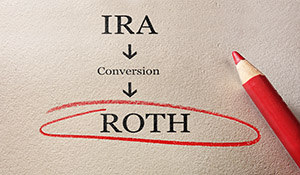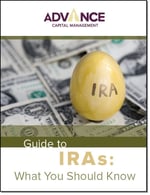Do You Need a Roth Conversion as You Prepare for Retirement?
August 3rd, 2022 | 3 min. read

A Roth IRA provides several advantages in retirement when you start to use your savings for income. And, transferring funds from your traditional individual retirement account to a Roth IRA is often a terrific tax strategy.
Whether you should consider a Roth conversion though depends on your current and expected future financial situation – and possibly the state of the market and the economy.
For some it can be an effective way to limit the tax bite in retirement. For others, the thought of limiting their required minimum distributions makes them feel more confident in the longevity of their savings.
Nonetheless, a Roth conversion isn’t always the right option. They can be tricky. And if done incorrectly, they can create some unintended headaches. So, here are some things to consider when determining whether a Roth conversion makes sense or doesn’t as you prepare for retirement.
What is a Roth conversion?
First of all, a Roth conversion refers to moving all or a portion of the funds from an existing IRA into a Roth IRA. Roth IRAs are generally a good idea for investors for a handful of reasons:
- Tax-free withdrawals for you and potentially your heirs
- Contributions and earnings grow tax-free
- No Required Minimum Distributions
- Allowable contributions after age 70 ½ (with earned income)
- Early withdrawals of contributions without penalty
You may be able to convert the following types of accounts into a Roth IRA:
- Traditional IRA
- Rollover IRA
- SEP IRA
- SIMPLE IRA
- SARSEP IRA
- Old 401k
- Old 403b
- Old governmental 457b
What is your tax situation now versus the future?
Roth IRA contributions are made with after-tax dollars. So, you will owe federal income taxes on the amount you convert in that year. Therefore, if your income is lower this year than a typical year, a conversion may make sense for you. Also, if your tax rate will be the same or higher in retirement than it is today, then you might want to consider converting other accounts to a Roth IRA.
Have you experienced a significant drop in your account balance?
Many people choose to do Roth conversions during market downturns. Essentially, this strategy turns lemons into lemonade.
That’s because a downside of a Roth conversion is that the conversion is taxable at your ordinary income rate. But, when your investments are down, the amount on which you will be taxed is lower, too. Hence, a conversion may make sense during a stock market downturn as you would owe less taxes on the smaller account balance than during a normal market.
When do you need the money?
If the time you need to start making withdrawals is less than five years, it’s not a good idea to convert because of the five-year holding requirement. This rule specifies that you must own the account for five years before you can withdraw your earnings in the account tax-free. Each conversion starts a new five-year window. The clock begins on January 1 for the year in which the conversion was done. This means you can wait until December to see what your tax situation is for the year before doing a conversion.
The benefit of converting to a Roth typically increases the longer your money remains in it. That’s because Roth IRAs are not subject to RMD rules the IRS has in place for pre-tax retirement accounts. Therefore, your assets can grow tax-deferred for a longer period of time, which provides your savings additional time for compounding growth.
How much is a Roth conversion going to cost you?
Because you are required to pay federal income taxes on the conversion, you need to consider the cost and whether you can afford it in that year. You also want to consider how much you can convert without moving into a higher tax bracket.
Additional income from a Roth conversion could push you into a higher tax bracket. If that’s the case, instead of converting an entire IRA, you may want to convert just a portion that will not affect your income tax rate.
Retirees in particular have to be careful the income resulting from their Roth conversion doesn’t push them into a higher Medicare income bracket, meaning they would have to pay higher Medicare Part B and possibly Part D premiums.
Ideally, you should pay the taxes on a Roth conversion using cash or other savings held in non-retirement accounts. Using funds from a retirement account to pay taxes on the conversion reduces the amount you would have available to potentially grow tax-free in your new Roth IRA. Additionally, if you are under age 59 ½, using the funds from a retirement account could result in an additional 10% tax penalty, which significantly reduces the likely benefit of a conversion.
Why Roth conversions don’t make sense on your own
Ultimately, the answer depends on your entire financial picture. You will most likely have other income sources, from Social Security to part-time work. It is important to determine how those sources work best together to maximize your income and limit your tax liability.
Roth conversions can be complicated. They can trigger unintended consequences if you’re not careful. Creating a financial plan or reviewing the one you have is a great place to start. For a more definitive answer, consult with a financial adviser who can take a close look at your situation to help you determine if a Roth conversion makes sense for your retirement.
Learn more about saving and investing in an IRA by downloading our Guide: IRAs: What You Should Know. Whether you’re a stay-at-home parent, small business owner, freelancer or someone who just doesn’t like their 401(k), our guide explains how you can save for retirement.
Advance Capital Management is a fee-only RIA serving clients across the country. The Advance Capital Team includes financial advisers, investment managers, client service professionals and more -- all dedicated to helping people pursue their financial goals.


